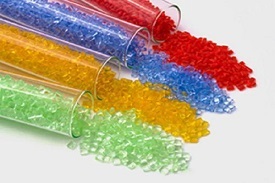
Polyvinyl chloride (PVC) homopolymers are a type of thermoplastic polymer consisting solely of vinyl chloride monomer units polymerized together through a chemical process. PVC homopolymers are known for their versatility, durability, and cost-effectiveness, making them one of the most widely used plastics globally. These materials exhibit excellent chemical resistance, weatherability, and fire-retardant properties, making them suitable for a wide range of applications across various industries. PVC homopolymers are commonly used in construction for pipes, fittings, profiles, and siding due to their strength, corrosion resistance, and ease of installation. They are also utilized in the automotive industry for interior and exterior trim components, wire insulation, and gaskets. PVC homopolymers find applications in consumer goods such as packaging films, bottles, toys, and medical devices due to their versatility, affordability, and ease of processing. Despite their widespread use, concerns have been raised about the environmental impact of PVC due to the release of harmful chemicals during production and disposal, leading to efforts to develop more sustainable alternatives.
IS 17658:2021 is a crucial standard in the polymer manufacturing industry, focusing on Poly Vinyl Chloride (PVC) homopolymers. This standard serves as a critical guideline for manufacturers, outlining comprehensive specifications and quality requirements for PVC homopolymers used in various industrial applications. By establishing clear parameters for factors such as chemical composition, molecular weight distribution, thermal stability, and mechanical properties, IS 17658:2021 ensures that PVC homopolymers meet stringent standards for consistency, reliability, and performance. Compliance with this standard ensures the quality and reliability of PVC homopolymers and promotes their safe and effective use in industries such as construction, automotive, and packaging. Adherence to IS 17658:2021 facilitates regulatory compliance and contributes to the overall sustainability and competitiveness of the polymer industry by providing a standardized framework for manufacturers and end-users.
Note: Obtaining the ISI/BIS Certification is a mandatory requirement for manufacturers of Poly Vinyl Chloride (PVC) homopolymers to sell their products in the Indian market.
Manufacturers must obtain ISI/BIS certification for their PVC homopolymers to legally market and sell these products within India. This certification is a crucial validation of compliance with specific quality and safety standards mandated by the BIS for the production and distribution of PVC homopolymers. Without the ISI/BIS certification, manufacturers face potential legal repercussions and barriers in accessing the Indian market. Therefore, securing this certification is not only a regulatory requirement but also an essential step for manufacturers to demonstrate the reliability, compliance, and quality of their PVC homopolymers. This certification process underscores the importance of ensuring the integrity and safety of materials used in various industries. It instills confidence among stakeholders in the manufacturing and chemical sectors regarding its suitability and adherence to Indian standards for usage and distribution.
Only manufacturers (domestic or foreign) who produce the finished product will be awarded ISI Certification. This will not be given to any product importers, traders, dealers, or distributors.
Indian Standards Institute, or ISI was renamed the Bureau of Indian Standards (BIS) in 1987. The official mark that the Bureau of Indian Standards provides for manufacturers of various goods is the ISI Mark. It is used to indicate compliance with Indian standards (IS) set by the Bureau of Indian Standards (BIS) and has been used as a conformity marking for industrial products. Manufacturers received permission from BIS to use the ISI Mark on items that comply with relevant Indian requirements through the product certification program.
Only manufacturers (domestic or foreign) who produce the finished product will be awarded ISI Certification. This will not be given to any product importers, traders, dealers, or distributors.
The following documentation is required to get an ISI certification:
For more detailed information, please click here.
There are two approaches for Indian manufacturers to become certified with the ISI Mark:
Regular Procedure
With the possible exception of cases deemed "All India first," which might take up to 180 days, the licensing procedure is expected to be finished in 120 days. This timeline starts on the day the application is received, assuming that at different points in time the documentation, unit assessment, and product conformance are all deemed acceptable.
Step 1: Manufacturing Unit Customization in Compliance with Applicable Indian Standards
Step 2: Submission of the Application Form
For more detailed information, please click here.
Simplified Procedure
This is a much faster process than the standard procedure. After a factory inspection is deemed satisfactory and the initial evaluation establishes that the sample complies with the applicable Indian Standard(s), the license application process is expected to be finished in 30 days.
Step 1: Adapting the Manufacturing Unit to Comply with the Relevant Indian Standard
Step 2: Sample Testing
For more detailed information, please click here
The process of obtaining ISI Mark Certification for Foreign Manufacturers typically includes the following steps:
Step 1: Application
Step 2: Query Raised (If Any)
For more detailed information, please click here.
Brand Liaison provides helpful support for achieving ISI Mark Certification. Among our offerings are:
Please click here to get in contact with our team of specialists for a deeper explanation of the paperwork and steps needed to get ISI Mark Certification.